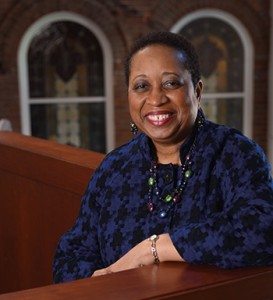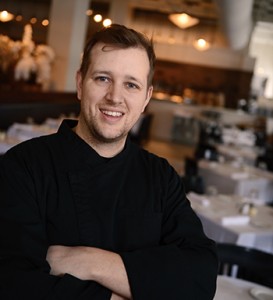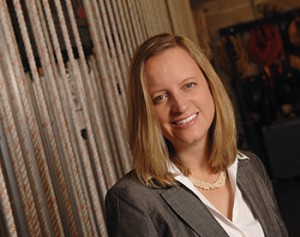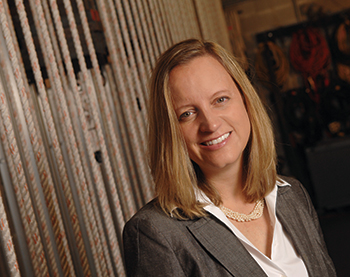Written by Kelly Roberson
Photos by Duane Tinkey
 Deneese Jones, Drake University
Deneese Jones, Drake University
The tests were conclusive, reported the school district: The little girl would need special education classes. And so Deneese “Dee” Jones, who spoke with distinct Ebonics linguistic patterns, entered the public education system, an African-American girl in recently desegregated Dallas, Texas, already labeled and shunted aside as “less than.” Undaunted, Jones’ mother insisted that her daughter was more than that designation, admonishing her: “Don’t cry about it; rise above it.”
Jones, now 61 and provost at Drake University, did much more than rise above her elementary school designation: She skyrocketed. Her early lessons in
perseverance and fortitude, as well as a healthy dose of hard work and a passion to serve, have defined Jones’ decades-long career in education. In only two years, she’s established herself as a strong advocate for Drake President David Maxwell and the students, faculty and staff.
Those special education classes turned out to be formative in an unexpected way: Jones began competing in speech contests. As her mother predicted, she did transcend those labels and eventually completed an undergraduate degree, taught for eight years, then earned both master’s and doctoral degrees in education from Texas A&M University. “I always aspired to be able to reach back, to be able to help somebody else,” Jones says. “That’s not just a cliché. A servant leader is how I see my role.”
Jones’ first higher education position was as a professor at the University of Kentucky, where she spent 15 years. Diversity was a key focus during her tenure, and she blossomed under the leadership of a mentor, UK Chancellor Robert Hemingway. “He magnified my strengths and showed me how to use them to develop the areas that needed it,” she says. “Before I just did tasks, but I thought about what the word ‘service’ meant, and focused on collaboration and thinking critically.”
In 2005, Jones moved to Longwood University in Virginia. Then one day she received a phone call: She had been nominated for the provost position at Drake University, a place and a state that she knew nothing about. But David Maxwell’s reputation intrigued her, as did the university’s strategic plan. “When I met with the search committee, I felt like it was a group of people who loved what they were doing and wanted to get better,” she says.
Meetings with students, faculty and staff convinced her that Drake was the right place for her, and she was named provost in 2012. She spent her first few months visiting with everyone from faculty to students and staff. She asked how to change the university for the better, and singled out people who were engaged, excited and focused on solutions. In two years, Jones identified key areas to cultivate, including diversity, the graduate and professional programs, and development through a proposed teaching and learning center.
Jones’ passion “is both inspiring and infectious,” Maxwell says, “and has connected her to students, faculty and staff in a powerful way.”
No matter what her endeavor, Jones remains laser-focused on building the talent around her. “Part of how I see myself is as a pioneer, not a settler. My life trajectory demonstrates that,” Jones says. “I’m always aware of those silenced voices. I can’t move away from a mindset of being a voice and an entity for those that are voiceless. That’s a gift that I bring.”
 Derek Eidson, Orchestrate Hospitality
Derek Eidson, Orchestrate Hospitality
In the basement of Django, there’s a secret dreamed up by a local boy with a passion for food. As diners upstairs devour French-inspired dishes, downstairs, Derek Eidson has cooked up a plan to cure meat for George Formaro’s expanding collection of restaurants.
For two years, Eidson, executive chef at Centro, and Johan Larsson, executive chef at Django, have been developing a state-licensed facility to output small-batch delicacies such as prosciutto. It’s one more way that Eidson can flex his culinary muscles and devote himself to the art of simple food done well. That’s been the hallmark of Centro for more than a decade, and it’s a reputation that Eidson continues to refine. He’s got more surprises up his sleeve, too, as part of the team that has quietly revolutionized eating in the capital city.
Eidson, 31, didn’t come from a foodie family. A Hoover High grad, he worked in a Hy-Vee kitchen during high school and ended up in the culinary track at Kirkwood Community College. During those formative years, Eidson discovered food skills and interests—as well as a think-on-his-feet know-how. “I washed dishes at a hotel in college and would go see what they were doing on the line,” Eidson says. “I learned that if they asked if I could do something, you say yes, and then learn it while you do it.”
Like many professions, the world of chefs is a small one; Eidson would intersect with a core group of people over the next decade. He cooked alongside Larsson at a restaurant in Cedar Rapids; after graduation, he moved to Des Moines for a three-year stretch at Sage. There was a short stint at Lucca, then his first position at Centro as sous chef. Eidson left in 2010 to open a restaurant in Indianapolis with friends; it closed a year later and he came back to Centro as sous chef, eventually moving to his current position.
Centro and the team at Orchestrate Hospitality foster a collaborative environment. Food is the focus, and the Centro staff has a longevity that’s unusual in the business. “We are only as good as the guys that are cooking,” Eidson says. “I think about food all the time. The guys that work under me think about food all the time.”
Eidson isn’t joking. He’s curing that meat for starters; for the time being, it will be sold only through the Orchestrate family. Eidson is also the creative brain behind newly initiated monthly osteria dinners. Italian osterias serve simple wine and food—unfussy, thoughtful, fresh, in season—and Eidson’s version has given him a chance for an in-depth exploration of Old World-inspired cuisine. The dinners have limited reservations and feature classic courses: hand-rolled pasta, antipasto, unusual wines and liqueurs. “It’s not about money; it’s about something fun and different than anywhere else,” he says.
Eidson has flourished under the leadership of Formaro and Paul Rottenberg, president of Orchestrate. And though chefs are notoriously impatient and easily bored, Eidson says, he seems to have found his food groove. “Working for George and Paul is great,” he says. “There’s no one else I’d ever rather work for anywhere. We never just settle, and say, ‘OK, that’s it. It’s as good as it gets.’ ”
Indeed, Formaro says, “Derek is the kind of chef who never stops learning. He loves the challenge of creating new dining experiences for himself as well as our customers. He thinks we can always be better tomorrow than we are today.”
 Laura Sweet, Des Moines Performing Arts
Laura Sweet, Des Moines Performing Arts
Ask Laura Sweet to describe her home in Des Moines and her job as vice president and chief operating officer of Des Moines Performing Arts (DMPA), and she’ll say it’s like a shoe that fits. It’s the story of her career, really: The Nebraska native has spent the last two decades perfectly fitting into jobs and places, lending her creative smarts and passion for the arts to organizations in three states.
Twenty years ago, Sweet, an only child, wasn’t sure she could ever be lured out of her home state, where her family has deep roots. A grandfather, Cliff, created Cliffs Notes, and her parents owned an independent bookstore. She had to be persuaded to leave a nine-year stint at a post-college advertising agency job in Lincoln—“I thought I would retire from that job,” Sweet, now 44, says—for a position as associate executive director at Lincoln’s Lied Center for Performing Arts. “I thought I would retire from that job, too,” she says.
But she was coaxed away from Nebraska in 2008 for a position as vice president of marketing at the Ordway Center for the Performing Arts in St. Paul. She and her husband, Mike, also a Nebraska native and a stockbroker turned science teacher, left Nebraska, delighting in the Twin Cities arts community and their new home.
And then a call came in 2012: Would Sweet consider a position at DMPA? “Initially I was not interested, but Mike encouraged me to hear them out,” she says. “We both fell in love with Des Moines and instantly felt a connection to the organization. This is where I felt like I was supposed to be.”
The DMPA team, led by President and CEO Jeff Chelesvig, played a major role in her decision. Sweet is Chelesvig’s eyes and ears when he’s not there, managing people and projects, “keeping the car on the road,” Sweet says. “What’s important to me is supporting and working for someone I trust and believe in.”
Sweet “has an incredible passion for the arts, and that’s something that can’t be taught. Having that passion is very important—it’s the secret sauce,” Chelesvig says. “She’s very upbeat … and has a lot of curiosity.”
Chelesvig also admires Sweet’s organizational skills as well as how she and Mike have embraced Des Moines: “She’s integrated herself in the community in a very short amount of time.”
Sweet’s duties include overseeing Cowles Commons, which is currently undergoing an $11 million renovation. Sweet also is involved in programming as well as helping to develop the education and outreach efforts of the four venues under the DMPA umbrella: the Des Moines Civic Center, Stoner Theater, Temple Theater and Cowles Commons.
Iowa may not be Nebraska, but it is, Sweet says, home. “I love what we are doing; I love the events we are presenting; I love my high-functioning, smart set of colleagues,” she says. “I can’t imagine a place I would want to work more. I have my dream job now.”









